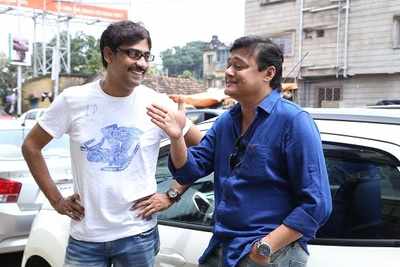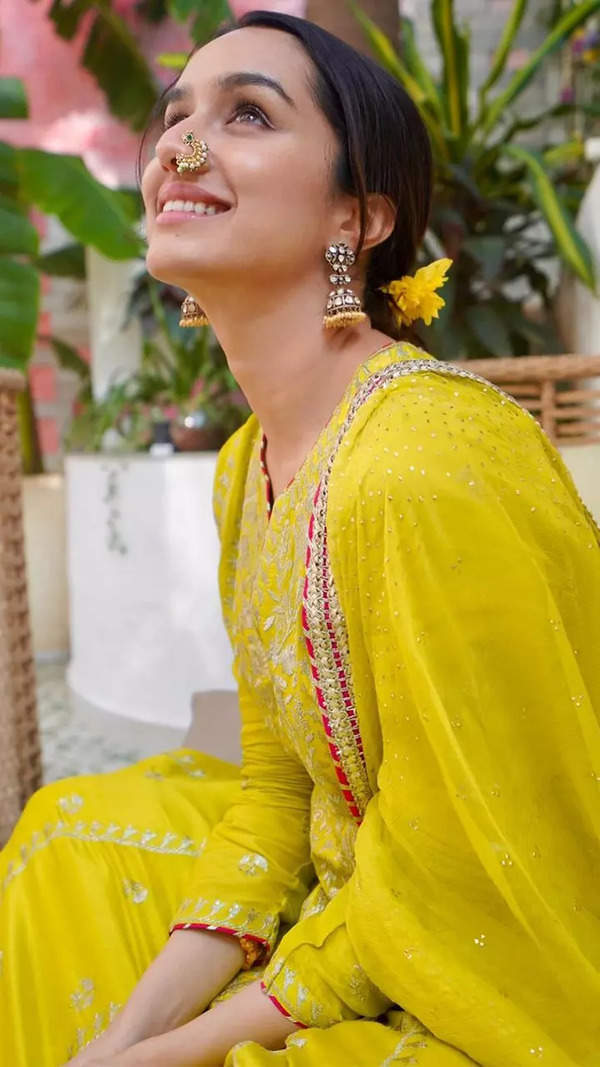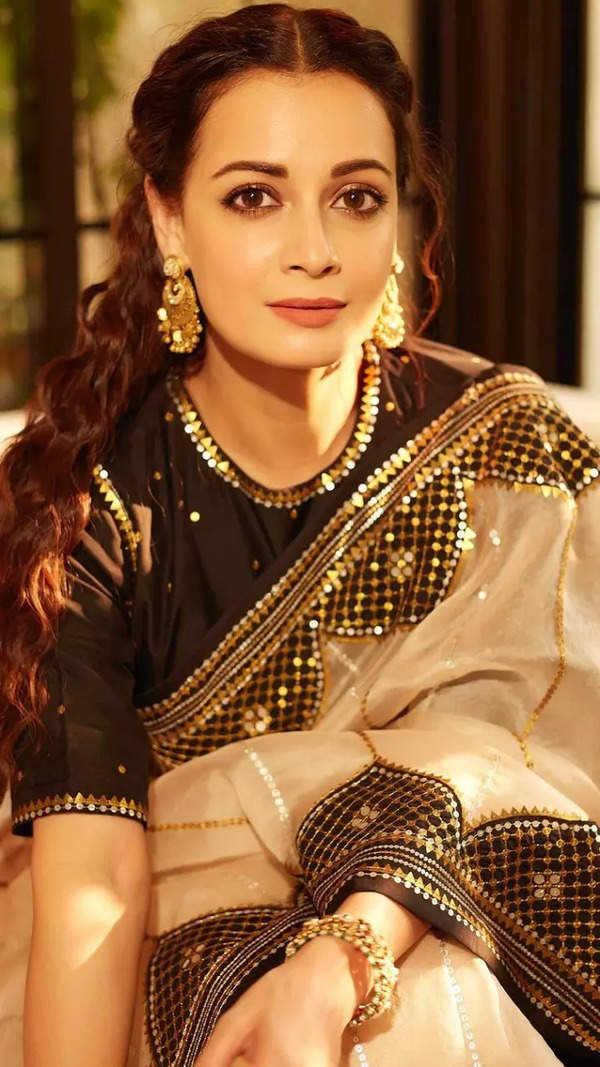- News
- entertainment
- bengali
- movies
- Rajkahini is world cinema, made in Bengali: Saswata, Kaushik Sen
Trending
This story is from September 12, 2015
Rajkahini is world cinema, made in Bengali: Saswata, Kaushik Sen
A candid interview with Saswata Chatterjee and Kaushik Sen, who play Prafulla and Iliyas in Srijit Mukherji's Rajkahini

A candid interview with Saswata Chatterjee and Kaushik Sen, who play Prafulla and Iliyas in Srijit Mukherji's Rajkahini
As we walk into the plush south Kolkata office where the inter view is scheduled, we spot Saswata Chatterjee sipping his second cup of coffee. Punctuality is his forte, as we have often heard. ���Where's Baban? Shouldn't we wait for him?" he asks.Turns out, Kaushik Sen (better known among friends as Baban) had to go out to buy medicines for his ailing domestic help.While we wait for the latter, Saswata peers out of the blinds and spots the poster of a film featuring Parambrata Chatterjee, Kaushik Sen and a young boy . Unable to make out the film's name, he says, ���Koto je film berocche, janteo parina..." And just then, Sen enters the room.
It's been a good year so far for both the actors. While Saswata made heads turn with his detective act in Arindam Sil's Ebar Shabor, Kaushik's antihero act in Anindya Chatterjee's Open Tee Bioscope was one of the highlights of that film. And now, both of them are gearing up for the release of Srijit Mukherji's magnum opus, Rajkahini. Over more cups of coffee, the actors talk about Partition, politics and lots more. Excerpts:
Partition's a trauma that has haunted Bengal and Bengalis for decades. But is it something that still affects people today? For instance, our generation?
Saswata (S): Partition was a major subject in most films by Ritwik Ghatak. Guess, the wounds had imprinted so deep in his mind that he couldn't escape it.
Why aren't there more films on this subject?
K: If you look at contemporary Bengali films, you will realize that few films subject current political situations to any scrutiny . In that context, Churni Ganguly's Nirbashito, after a long time, shows some political undercurrent. This is because in West Bengal, politics has been taken out of its larger context and moulded into a narrow, cinched concept.Taking risk has become a huge gamble. Neither directors, nor producers are ready for that.Theatre still enjoys some creative liberty. But, unfortunately, even that space has become restricted in the state.
Kaushik, you have been involved with theatre for three decades now. Did you enjoy this space more during the previous government's regime?
K: I'll be frank. During the early years of the Left regime, there were films which made no sense. Just because the people involved in those were close to the government, they could do it. That cannot be termed a `good space'. Tapan Sinha was threatened by the then government because his film Atonko revolved around a political murder. But still that film had a good run because there was a stagnancy . During Congress' time, were there no political films? Tarun Majumdar and Mrinal Sen made many such films. But the era was such that risks could be taken. The Left Front -the Opposition at that point -supported such films. When staging of plays such as Kallol and Dushapner Nagari were stopped by Congress and there were widespread pro tests, young CPM cadres stayed awake all night to provide protection to Utpal Dutt. They put up posters saying `Kallol cholchhe, Kallol cholbe'. A leading Bengali newspaper refused to print ads of Kallol, but the play survived only on the strength of posters! It's the same with films.But mass movements, which surpassed party politics, have gradually evaporated. It started during the Left regime and has continued. The situation has deteriorated in this government's rule.
So which political regime do you think swas the most favourable for art forms?
K: It's a good time now. A stagnant situation cannot give birth to good art. But when you find obstacles on your path, you find the fire inside you to do things.S: Yes, the frustration keeps building and, at one point, it bursts out and leads to revolution. As Rabindranath wrote, `Shanti kothai mor tore hai bishobhubon-majheAshanti je aghat kore tai to bina baje...'
Tell us about your characters, Prafulla and Iliyas, in Rajkahini.
K: I play Iliyas and Prafulla (played by Saswata) is my childhood friend. But when riots begin, prior to the Partition, it takes a toll on their friendship.S: There comes a time when they have to hide their friendship as they both represent different political parties -one professes the ideologies of Muslim League, while the other belongs to Congress. But they can't ignore the deep bond they share.
Srijit says he read a lot of Partition literature to prepare for Rajkahini. Did you do that?
Both: No. Because Srijit's script was brilliant. We didn't need any extra material.K: Also, I say this very humbly , the generation of actors we belong to, aamader ekta basic porashona aachei. We read up for certain characters, but we read a lot in general too. S: During the script reading session we went into a limbo! I might as well add, Rajkahini is world cinema, made in Bengali.
Kaushik, you have always been vocal with your anti-establish ment views. Yet, in this film, both of you play government agents.
S: (Laughs out loud) Etai to obhinetar jibon.
K: The script, as we move for ward in the film, actually brings out the human elements of the characters, not their political aspirations.
S: The brothel in the film acts as a microcosm for the trauma that the two sides of the border went through. How, a few women, sex workers, counter the progress of history!
Do you think in urban cinema, the `partition' between the good guy and the bad, the lines distinguishing the hero, antihero and antagonist are blurring?
K: Yes. It's happening in world cinema, it's happening in Bollywood, and there's no way Tollywood can stay blissfully unaware of it.
S: Thank God it is happening!
Yet, remakes, adaptations and borrowed literature form the chunk of Tollywood movies today. Not original scripts...
S: The reason being lack of time. For an original script, you need to think. Where is the time to think? That machine in your hand (points to the mobile phone) has rendered us powerless. (Saswata still doesn't use a cellphone).
K: When we were young, we were taught to observe. It's the first step of acting. But you can't observe when your brain is busy in other things!
S: I have a habit. Every morning, I look out of the window to observe the way people walk.Kato rakom bhabe je manush hante, you can't imagine!
K: Er thekei to charitro beriye aashe. The term `workshop' is a vague thing. For people like us who have taken up acting as a profession, life should be the workshop.
I remember my music teacher saying that voice training comes later, first you need to train the ears to listen...
S: Exactly . My father used to say, for an actor, the hardest distance to cover is the distance between his ears and his mouth. So I can correctly hear what I'm saying. So I can differentiate between right and wrong pronunciations. Nije na shunle lokke ki shonabo!
Srijit and some other film per sonalities have approached the state government for help to keep the industry alive. Do you think something can come out of this?
S: A good film in Bengal does not get more than two weeks on the big screen because of the lack of theatres. Chokher samne dekhte pelam, Ujjala-e khali chanachur ta pore roilo! There were so many halls in Bhawanipore. It was known as the cinema para!
K: Of course, government backing is needed! They can spare money .
Recensoring of films for TV audience has been put on hold, which means, A-rated films might not be screened during prime time on satellite channels. What do you think that entails for Rajkahini?
K: The subject of Rajkahini is such that if you get rid of the dialogues and violence, the film falls flat! But the stuff we see on TV every day -the news, the ads, what about them? Why does the censor board not filter them?
S: At least, in films, there's a fil tration process. You walk into the hall, you see the big ` A' mark and have to pass through the security... K: You know, this lack of matu rity in handling sexuality is the reason this state figures on top of sexual violence list. We've created such a sexually suppressed society that when a man sees a women, he fails to perceive her as a human being.
Srijit is known to be a strict director. And you two are senior actors. Were there clashes of ideas or egos on sets?
K: Srijit gave us a lot of free dom. I think, he came to trust our judgment too! But being actors, we honour the director's vision the most.
S: For one scene, we had to emote with half of our faces the other halves were hidden behind table lamps. The preci sion, the mathematics, the angles... it took a toll on us mentally! A side of our faces felt paralyzed. And we also had to portray the extreme conflict in these two characters. But, oi conflict ta dekhate giye jodi duto chokh beriye jaye? Re take! It was frustrating. We got furious with Srijit at one point.
Srijit says the entire cast would become as if possessed once the cameras started rolling...
S: In my entire career, I've never seen Rituparna Seng upta staying still in her position after an okay . Or not fiddling with her phone once the cameras have stopped! Or even coming to sets on time!
K: She'd come to the sets early even when she had no scene!
S: I will go far as to say, this is Ritu's best performance till date. Srijit has broken and rebuilt her from scratch.
Apparently, Bratya Basu was offered a role in this film, but he didn't take it. Do you think that is because...
K: (Interrupts) ...I'm there in the film? (smiles broadly) No.Because, later, when I met up with him, thanks to our plays Boma and Antigone, we came to this understanding that political differences can stay in their own places, it cannot harm our relationship as fellow theatre artistes. As far as I know, he couldn't do it because of his tight schedule.
What was the best part of working in Rajkahini?
K: Srijit's team of assistant directors and technicians.Everybody worked together seamlessly . Reason why this physically tiring shoot -we shot during chilling winter nights and at backbreaking locations -was completed so smoothly. Srijit commands an army of soldiers.
As we walk into the plush south Kolkata office where the inter view is scheduled, we spot Saswata Chatterjee sipping his second cup of coffee. Punctuality is his forte, as we have often heard. ���Where's Baban? Shouldn't we wait for him?" he asks.Turns out, Kaushik Sen (better known among friends as Baban) had to go out to buy medicines for his ailing domestic help.While we wait for the latter, Saswata peers out of the blinds and spots the poster of a film featuring Parambrata Chatterjee, Kaushik Sen and a young boy . Unable to make out the film's name, he says, ���Koto je film berocche, janteo parina..." And just then, Sen enters the room.
It's been a good year so far for both the actors. While Saswata made heads turn with his detective act in Arindam Sil's Ebar Shabor, Kaushik's antihero act in Anindya Chatterjee's Open Tee Bioscope was one of the highlights of that film. And now, both of them are gearing up for the release of Srijit Mukherji's magnum opus, Rajkahini. Over more cups of coffee, the actors talk about Partition, politics and lots more. Excerpts:
Partition's a trauma that has haunted Bengal and Bengalis for decades. But is it something that still affects people today? For instance, our generation?
Kaushik (K): My father was born in Dhaka and we had a home in Barisal. I've grown up listening to stories of how they fled East Bengal. They made it look like they're out for a walk by the steamer ghat, so people wouldn't understand that they were fleeing. My grandfather's friends had already warned him they won't be able to save our Hindu family from extremists anymore. Yes, we did not personally witness those turmoils, but caused a chain reaction. The brunt was borne by this state's financial and political structure. The war of 1971 was officially on for just two weeks, but it rendered 10 million people homeless.
Saswata (S): Partition was a major subject in most films by Ritwik Ghatak. Guess, the wounds had imprinted so deep in his mind that he couldn't escape it.
Why aren't there more films on this subject?
K: If you look at contemporary Bengali films, you will realize that few films subject current political situations to any scrutiny . In that context, Churni Ganguly's Nirbashito, after a long time, shows some political undercurrent. This is because in West Bengal, politics has been taken out of its larger context and moulded into a narrow, cinched concept.Taking risk has become a huge gamble. Neither directors, nor producers are ready for that.Theatre still enjoys some creative liberty. But, unfortunately, even that space has become restricted in the state.
Kaushik, you have been involved with theatre for three decades now. Did you enjoy this space more during the previous government's regime?
K: I'll be frank. During the early years of the Left regime, there were films which made no sense. Just because the people involved in those were close to the government, they could do it. That cannot be termed a `good space'. Tapan Sinha was threatened by the then government because his film Atonko revolved around a political murder. But still that film had a good run because there was a stagnancy . During Congress' time, were there no political films? Tarun Majumdar and Mrinal Sen made many such films. But the era was such that risks could be taken. The Left Front -the Opposition at that point -supported such films. When staging of plays such as Kallol and Dushapner Nagari were stopped by Congress and there were widespread pro tests, young CPM cadres stayed awake all night to provide protection to Utpal Dutt. They put up posters saying `Kallol cholchhe, Kallol cholbe'. A leading Bengali newspaper refused to print ads of Kallol, but the play survived only on the strength of posters! It's the same with films.But mass movements, which surpassed party politics, have gradually evaporated. It started during the Left regime and has continued. The situation has deteriorated in this government's rule.
So which political regime do you think swas the most favourable for art forms?
K: It's a good time now. A stagnant situation cannot give birth to good art. But when you find obstacles on your path, you find the fire inside you to do things.S: Yes, the frustration keeps building and, at one point, it bursts out and leads to revolution. As Rabindranath wrote, `Shanti kothai mor tore hai bishobhubon-majheAshanti je aghat kore tai to bina baje...'
Tell us about your characters, Prafulla and Iliyas, in Rajkahini.
K: I play Iliyas and Prafulla (played by Saswata) is my childhood friend. But when riots begin, prior to the Partition, it takes a toll on their friendship.S: There comes a time when they have to hide their friendship as they both represent different political parties -one professes the ideologies of Muslim League, while the other belongs to Congress. But they can't ignore the deep bond they share.
Srijit says he read a lot of Partition literature to prepare for Rajkahini. Did you do that?
Both: No. Because Srijit's script was brilliant. We didn't need any extra material.K: Also, I say this very humbly , the generation of actors we belong to, aamader ekta basic porashona aachei. We read up for certain characters, but we read a lot in general too. S: During the script reading session we went into a limbo! I might as well add, Rajkahini is world cinema, made in Bengali.
Kaushik, you have always been vocal with your anti-establish ment views. Yet, in this film, both of you play government agents.
S: (Laughs out loud) Etai to obhinetar jibon.
K: The script, as we move for ward in the film, actually brings out the human elements of the characters, not their political aspirations.
S: The brothel in the film acts as a microcosm for the trauma that the two sides of the border went through. How, a few women, sex workers, counter the progress of history!
Do you think in urban cinema, the `partition' between the good guy and the bad, the lines distinguishing the hero, antihero and antagonist are blurring?
K: Yes. It's happening in world cinema, it's happening in Bollywood, and there's no way Tollywood can stay blissfully unaware of it.
S: Thank God it is happening!
Yet, remakes, adaptations and borrowed literature form the chunk of Tollywood movies today. Not original scripts...
S: The reason being lack of time. For an original script, you need to think. Where is the time to think? That machine in your hand (points to the mobile phone) has rendered us powerless. (Saswata still doesn't use a cellphone).
K: When we were young, we were taught to observe. It's the first step of acting. But you can't observe when your brain is busy in other things!
S: I have a habit. Every morning, I look out of the window to observe the way people walk.Kato rakom bhabe je manush hante, you can't imagine!
K: Er thekei to charitro beriye aashe. The term `workshop' is a vague thing. For people like us who have taken up acting as a profession, life should be the workshop.
I remember my music teacher saying that voice training comes later, first you need to train the ears to listen...
S: Exactly . My father used to say, for an actor, the hardest distance to cover is the distance between his ears and his mouth. So I can correctly hear what I'm saying. So I can differentiate between right and wrong pronunciations. Nije na shunle lokke ki shonabo!
Srijit and some other film per sonalities have approached the state government for help to keep the industry alive. Do you think something can come out of this?
S: A good film in Bengal does not get more than two weeks on the big screen because of the lack of theatres. Chokher samne dekhte pelam, Ujjala-e khali chanachur ta pore roilo! There were so many halls in Bhawanipore. It was known as the cinema para!
K: Of course, government backing is needed! They can spare money .
Recensoring of films for TV audience has been put on hold, which means, A-rated films might not be screened during prime time on satellite channels. What do you think that entails for Rajkahini?
K: The subject of Rajkahini is such that if you get rid of the dialogues and violence, the film falls flat! But the stuff we see on TV every day -the news, the ads, what about them? Why does the censor board not filter them?
S: At least, in films, there's a fil tration process. You walk into the hall, you see the big ` A' mark and have to pass through the security... K: You know, this lack of matu rity in handling sexuality is the reason this state figures on top of sexual violence list. We've created such a sexually suppressed society that when a man sees a women, he fails to perceive her as a human being.
Srijit is known to be a strict director. And you two are senior actors. Were there clashes of ideas or egos on sets?
K: Srijit gave us a lot of free dom. I think, he came to trust our judgment too! But being actors, we honour the director's vision the most.
S: For one scene, we had to emote with half of our faces the other halves were hidden behind table lamps. The preci sion, the mathematics, the angles... it took a toll on us mentally! A side of our faces felt paralyzed. And we also had to portray the extreme conflict in these two characters. But, oi conflict ta dekhate giye jodi duto chokh beriye jaye? Re take! It was frustrating. We got furious with Srijit at one point.
Srijit says the entire cast would become as if possessed once the cameras started rolling...
S: In my entire career, I've never seen Rituparna Seng upta staying still in her position after an okay . Or not fiddling with her phone once the cameras have stopped! Or even coming to sets on time!
K: She'd come to the sets early even when she had no scene!
S: I will go far as to say, this is Ritu's best performance till date. Srijit has broken and rebuilt her from scratch.
Apparently, Bratya Basu was offered a role in this film, but he didn't take it. Do you think that is because...
K: (Interrupts) ...I'm there in the film? (smiles broadly) No.Because, later, when I met up with him, thanks to our plays Boma and Antigone, we came to this understanding that political differences can stay in their own places, it cannot harm our relationship as fellow theatre artistes. As far as I know, he couldn't do it because of his tight schedule.
What was the best part of working in Rajkahini?
K: Srijit's team of assistant directors and technicians.Everybody worked together seamlessly . Reason why this physically tiring shoot -we shot during chilling winter nights and at backbreaking locations -was completed so smoothly. Srijit commands an army of soldiers.
End of Article
FOLLOW US ON SOCIAL MEDIA









